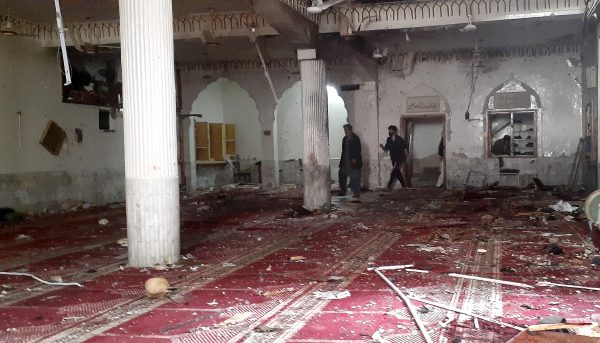
At least 30 Shiite Muslims were killed and dozens others wounded in the suicide attack on a mosque in Peshawar.
A powerful bomb exploded inside a Shiite Muslim mosque in Pakistan’s northwestern city of Peshawar on Friday, killing at least 30 worshippers and wounding dozens more, many of them critically, police said.
Local police official Waheed Khan said the explosion occurred as worshippers had collected in the Kucha Risaldar mosque in Peshawar’s old city for Friday prayers. Ambulances rushed through congested narrow streets carrying the wounded to Lady Reading Hospital, where doctors worked feverishly.
Peshawar police Chief Muhammed Ejaz Khan said the violence started when two armed attackers opened fire on police outside the mosque. One attacker and one policeman were killed in the gunfight, and another police official was wounded. The remaining attacker then ran inside the mosque and detonated a bomb.
According to eyewitnesses, there were at least 150 worshippers inside the mosque at the time of the explosion.
Diplomat Brief Weekly Newsletter N Get briefed on the story of the week, and developing stories to watch across the Asia-Pacific. Get the Newsletter
A witness told Geo News that a man dressed in black entered the mosque after shooting dead the security guard. “After that, he quickly entered the [mosque’s] main hall and blew himself up in front of the pulpit. Following this, there were bodies and injured people lying everywhere,” he said.
Enjoying this article? Click here to subscribe for full access. Just $5 a month.
Peshawar Senior Superintendent of Police Operations Haroon Al-Rasheed told Geo News that it appeared to be a suicide attack.
“The hall was filled with people; they were on the bottom and top floors; the incident took place at 12:55 pm.”
No one immediately claimed responsibility for the blast, but both the Islamic State group and a violent Pakistani Taliban organization have carried out similar attacks in the region, located near the border with neighboring Afghanistan.
Shayan Haider, a witness, had been preparing to enter the mosque when a powerful explosion threw him to the street.
“I opened my eyes and there was dust and bodies everywhere,” he said.
At the Lady Reading Hospital Emergency department, there was chaos as doctors struggled to move the many wounded into operating theaters. Hundreds of relatives gathered outside the emergency department, many of them wailing and beating their chests, pleading for information about their loved ones.
Prime Minister Imran Khan condemned the bombing.
Interior Minister Sheikh Rashid said the attack was “a conspiracy to destabilize Pakistan at the time when an international [Australian] cricket team is visiting the country.”
Retired army officer Sher Ali, who had been inside the mosque at the time of the explosion, was injured by flying shrapnel. He made an impassioned plea to the Pakistani government for better protection of the country’s minority Shiite Muslims.
“What is our sin? What have we done? Aren’t we citizens of this country?” he said from within the emergency department, his white clothes splattered with blood.
Enjoying this article? Click here to subscribe for full access. Just $5 a month.
In majority Sunni Muslim Pakistan, minority Shiite Muslims have come under repeated attacks.
In recent months Pakistan has experienced a broad increase of violence. Dozens of military personnel have been killed in scores of attacks on army outposts along the border with Afghanistan. Many of the attacks have been claimed by the Pakistani Taliban, which analysts say have been emboldened by the Afghan Taliban’s return to power last August.
Pakistan has urged Afghanistan’s new rulers to hand over Pakistani Taliban insurgents who have been staging their attacks from Afghanistan. Afghanistan’s Taliban say their territory will not be used to stage attacks against anyone, but until now they have not handed over any Pakistani insurgents.







